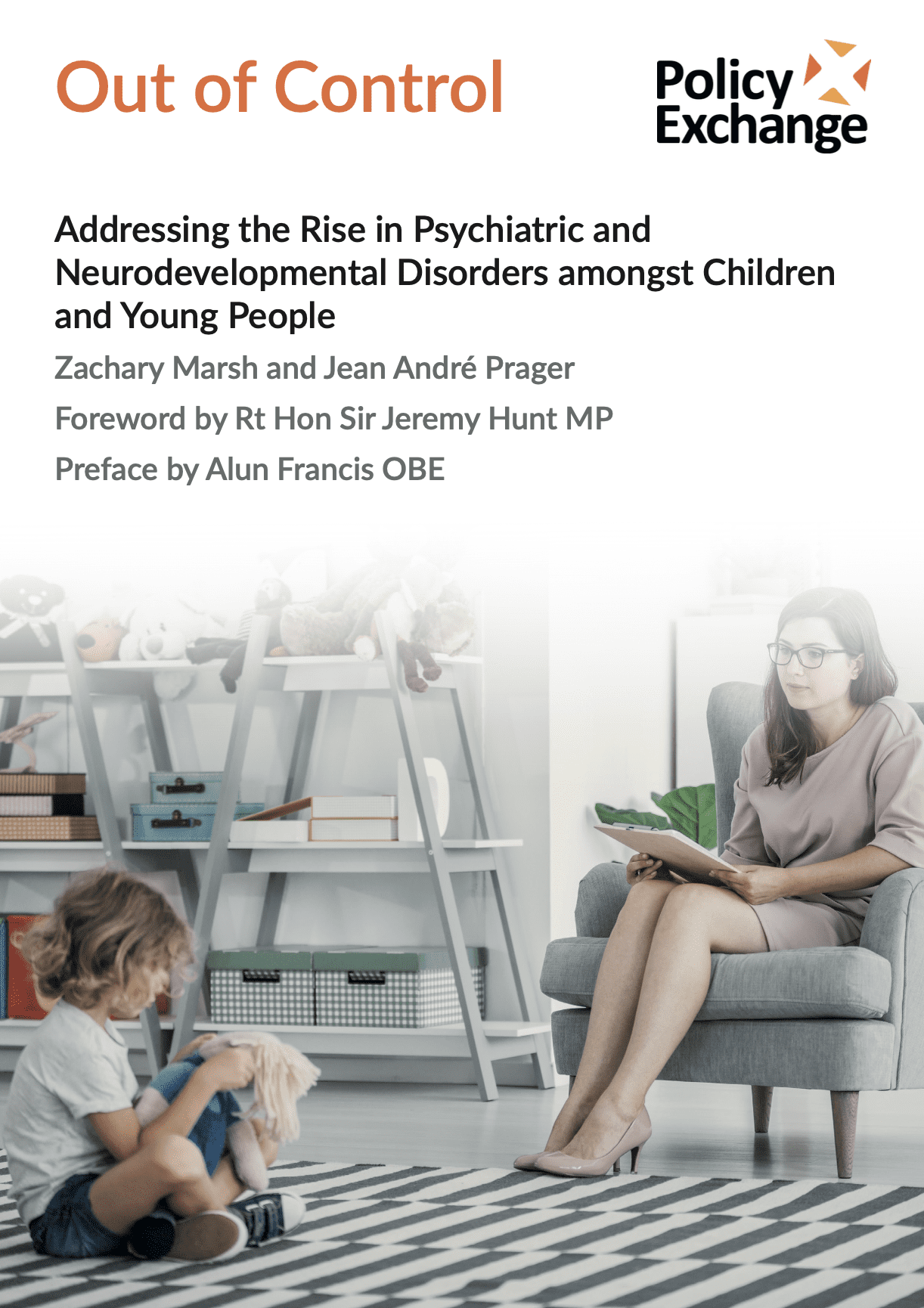Out of Control
Addressing the Rise in Psychiatric and Neurodevelopmental Disorders amongst Children and Young People
This new report by Policy Exchange identifies how poor incentives have driven overdiagnosis of mental ill health and neurodivergence in young people, stretching key public services to breaking point. It takes a unique, holistic view of the systems to support young people across health, education and welfare. The costs of support across all three areas have spiralled to tens of billions each year, whilst young people struggle to access early help and those with the most severe needs lose out.
In ‘Out of Control’ Policy Exchange argues that ‘concept creep’ has stretched societal definitions of mental ill health and neurodivergence too far, with families facing perverse incentives to seek diagnoses to access extra support. As a result these systems are radically becoming unsustainable, with urgent reform required.
The report reveals:
- 1 in 5 children in England is now reported to have SEND. Since 2015 Education, Health and Care Plans, designed for children with the most severe needs, have increased 83%, whilst since 2014 NHS Referrals to children’s mental health services by 50% and Disability Living Allowance claimants at 15 by 20%.
- Half of all schools spending since 2015 has gone on SEND, with costs to hit £11bn a year in 2024/25. Child Disability Living Allowance is projected to hit £6.4bn by the end of the decade. Young person’s mental health now costs the NHS over £1bn a year.
- The SEND, child disability and mental health systems are failing to distinguish between legitimate and exaggerated claims for support. 94% of Education Health and Care Plan assessments were successful in 2024, whilst the vast majority of assessments for Disability Living Allowance are conducted without the assessor ever meeting the child.
The report calls for the current SEND system to be radically overhauled, with EHCPs only for students in special schools, and councils and professionals empowered to manage budgets and resources.
In a Foreword to the report Rt Hon Jeremy Hunt MP, former Chancellor of the Exchequer and Secretary of State for Health and Social Care, said:
“This new report from Policy Exchange is timely and prescient. It calls for nothing less than a fundamental re-evaluation of how we conceive and deliver support for our children and young people. It is to be welcomed in particular for its exploration of the interplay between NHS mental health services, the Special Educational Needs and Disabilities (SEND) system and the health and disability benefits system. By comparing these distinct yet linked systems, the authors illuminate the connections, incentives – and ultimately, the poor outcomes that too often stem from it. It shines a light on the emphasis and implications of support which hinges upon a formal diagnosis – and how this drives behaviours. The report also highlights that support can be poorly targeted, with reactive systems and limited and ineffective early intervention.”
In a preface to the report Alun Francis OBE, Chair of the Social Mobility Commission, says:
“This report’s radical proposals for SEND are particularly noteworthy – and timely.
For too long, SEND has been viewed through a lens of deficit; a system characterised by bureaucratic hurdles, fragmented support, and a focus on what a child cannot do, rather than their potential. It has encouraged families and schools to escalate and entrench needs – rather than empowering the system to meet these more proactively and flexibly. They embark on a journey expecting a positive outcome, but find themselves in a disappointing dead end.
This report makes the compelling case that we must move from a tick-box attitude that solely prioritises ‘meeting need’ to one which has efficacy and outcomes at its core.”
The launch of this report was covered by:
Related Publications
Authors


Zachary Marsh
Research Fellow


Jean-Andre Prager
Senior Fellow




